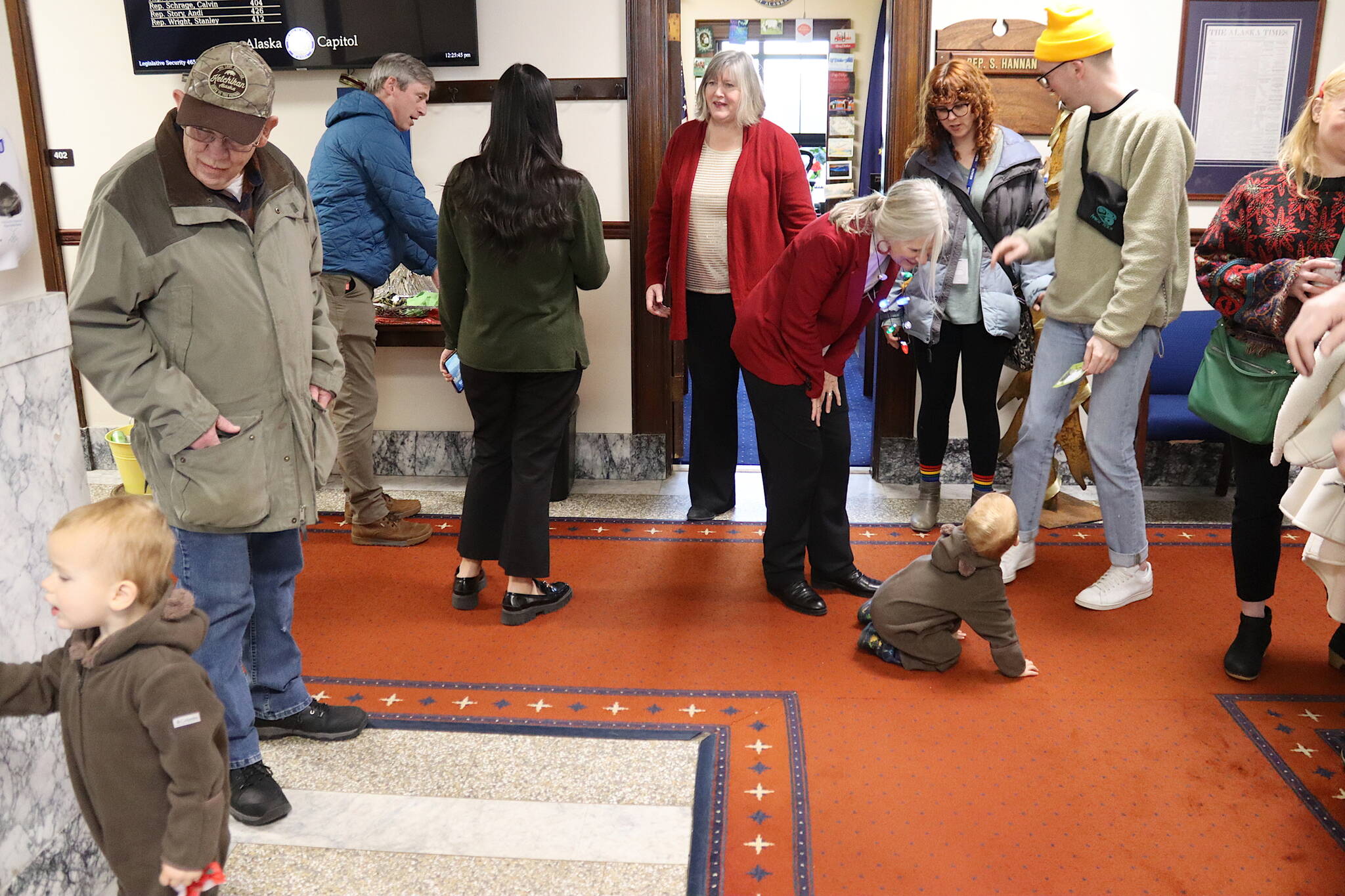John Roxburgh recited three holiday season wishes to the bearded host of the festivities, as music, cookies and chocolate flowed freely among others making themselves merry in the regal room. First, he said, is getting people to give peace a chance when it comes to arguing about what time it is.
That means doing away with “ridiculous” twice-yearly clock changes, Roxburgh said. He also wants state constitutional protection for gay marriage, along with daily ferry service from Juneau to Haines and Skagway.
His would-be benefactor — state Sen. Jesse Kiehl, a Juneau Democrat — isn’t Santa Claus and so the first two wish list items were a bit much to hope for in a Christmas stocking. However, Kiehl was able to reassure Roxburgh during the annual holiday open house hosted by Juneau’s three legislators at the Alaska State Capital on Tuesday that daily ferry service in northern Lynn Canal next summer isn’t currently in the proverbial coal bin.
“The summer schedule that’s out now has that, as long as we can crew the ships,” Kiehl told Roxburgh, who like many others who came to the open house was a familiar face.
Scores of constituents and other visitors came by the offices of the delegation members to swap greetings, serious policy talk and/or various edibles ranging from healthy to, um, indulgent.
Dave and Nadine Lefebvre took part in all three activities, which for him was his second open house after coming to last year’s. Meanwhile, she is a longtime advocate of state workers’ rights making sure her message about making pension reform a priority during the upcoming session is heard.
“I just wanted to come down and say hello, and be social, wish them happy holidays, and thank them for what they do,” he said.
Nadine Lefebvre said she knows the local trio of legislators are familiar with issues such as pension reform — which they’ve highlighted during the past session and in previous years — but at the open house “we’ve had the opportunity to ask questions and get some ideas on our delegation’s priorities for this session.”
“Certainly it’s the funding for education, raising the Base Student Allocation,” she said. “The discussion on a return to defined (state employee retirement) is absolutely critical to maintaining an Alaskan workforce in Alaska. You can see across the state we have retention issues, especially with our first responders, if you look at the recruitment and retention for troopers, for city police, firefighters, EMTs. These are folks who get trained here, they can work five years, take their 401K and leave. While they’re committed to their calling they’re no longer committed to an employer that isn’t going to honor them throughout their career.”
Rep. Sara Hannan said she agrees education funding is again going to be among the main issues of the upcoming session. The statutory per-student formula known as the BSA has remained virtually unchanged since 2017, thus causing the real funds allocated to schools to be significantly eroded due to inflation. The Legislature approved a one-time increase of $680 during the past session — about half of what many education advocates sought to offset the years of inflation — but Gov. Mike Dunleavy vetoed half of the increase.
That veto and other actions resulting from the past session should serve as a lesson for the 19 legislators who were freshmen at the start of last year’s session (although some had been previously elected to office in years past), and thus possibly lead to different outcomes, Hannan said.
“What I do know is that the freshmen had a steep learning curve and a lot of them learned new things after the vetoes,” she said. “There were many people who when some of the vetoes happened felt like they’d been betrayed or lied to. And they would say ‘Well, we heard the governor would support this’ and I said ‘Did you ask what support meant?’ Because in this business when someone’s not disagreeing with you or shaking their head you think they’re agreeing with you and they support it in the way that you’ve supported it, they’ll vote for it, they’ll fund that. But that’s not what it means.”
The issues of education and pension reform were the first two mentioned by Rep. Andi Story during a brief interview in her office. She said she’s hoping public pressure — especially during an election year — will provide the incentive for lawmakers to take meaningful action on those and other issues.
“People have more power than they think they do,” she said. “And statewide pressure I’m hoping is going to move education finding and returning to a defined benefits program.”
Story said she is also advocating other pending or new bills she’s hoping to see pass this session, including making more students eligible for Alaska Performance Scholarships and increasing the amounts of the stipends, as well as a colleague’s bill expanding paid family leave.
Kiehl, who engaged with visitors about issues ranging from low-cost power to allowing people ages 16 and 17 to vote in municipal elections, shared Hannan’s belief that an election year should result in public pressure for an education spending increase. Also, he agreed a year of experience among the current group of legislators will be important in trying to pass bills that also get the approval of the governor.
“Last year this time he was talking about working with everybody, and lots of meetings and lots of conversations,” Kiehl said. “That’s not something he ended up doing. But the conversations I’ve had with him this fall give us a sense of where there’s room to work with him where possible and where we might end up working against him when necessary.”
• Contact Mark Sabbatini at mark.sabbatini@juneauempire.com or (907) 957-2306.

